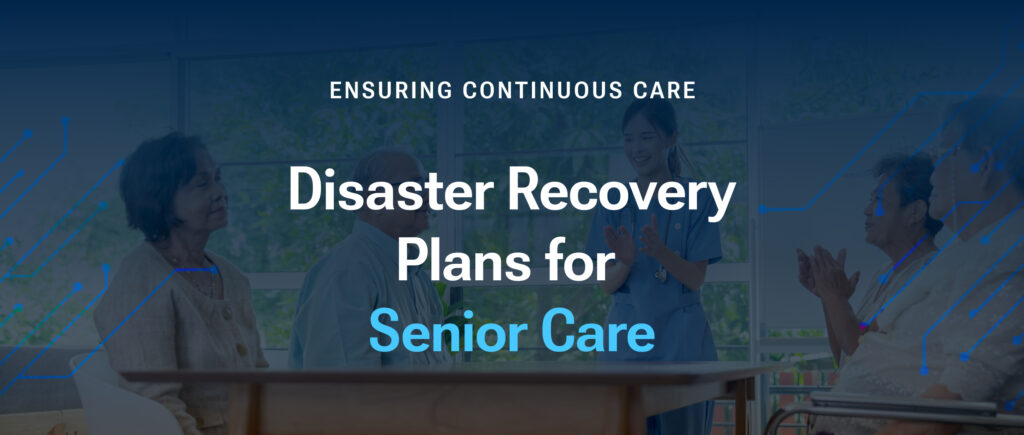In senior care facilities, providing uninterrupted care is a critical responsibility. While much of the focus is on patient care, the underlying IT infrastructure plays a key role in maintaining this continuity. Without proper systems in place, an IT failure could disrupt essential services, putting both operations and patient care at risk. This is where disaster recovery plans for senior care become indispensable. A well-prepared disaster recovery plan ensures that your facility can recover quickly from IT issues, safeguarding patient records and maintaining compliance with healthcare regulations.
In this blog, we’ll explore the importance of disaster recovery plans for senior care facilities, how they work, and the role of Advance Network Design in creating robust, dependable recovery solutions.
1. Why Disaster Recovery Plans Are Essential for Senior Care Facilities
Senior care facilities manage large amounts of sensitive data, including medical records, personal information, and financial details. These systems must run smoothly 24/7 to ensure that residents receive the care they need. Any disruption, whether from a cyberattack, hardware failure, or natural disaster, can lead to a loss of access to critical information, impacting both patient care and facility operations.
Key risks of not having a disaster recovery plan:
- Loss of patient data: Without a secure backup, vital records could be lost, compromising patient safety and care.
- Operational downtime: IT failures can halt operations, delay important medical decisions, and even result in regulatory penalties.
- HIPAA violations: Failure to protect patient data or quickly recover from an IT failure can result in costly fines under HIPAA and other healthcare regulations.
For facilities in Oklahoma City, Bethany, and Midwest City, partnering with Advance Network Design ensures that they have comprehensive Disaster Recovery plans in place, minimizing downtime and maintaining compliance with industry standards.
2. Components of an Effective Disaster Recovery Plan
A disaster recovery plan is more than just a set of instructions to follow in case of an emergency. It’s a strategic framework that prepares your facility for various scenarios, ensuring a swift return to normal operations.
Key components of a disaster recovery plan include:
- Data backup: Regular backups of patient records, billing information, and other critical data are essential. These backups should be stored offsite or in the cloud to protect against local disasters.
- Recovery time objective (RTO): The amount of time it takes to restore your systems after a failure. A shorter RTO means less disruption to your facility’s operations.
- Recovery point objective (RPO): The amount of data that can be lost between the last backup and the failure. Lower RPO values ensure minimal data loss.
- Emergency communication plan: Ensuring staff, patients, and family members are informed about IT disruptions and recovery efforts helps manage expectations and minimize panic.
Facilities in Nichols Hills and The Village can benefit from Advance Network Design’s expertise in building and implementing custom disaster recovery plans that meet their specific needs. Whether you’re dealing with power outages, hardware failure, or cyberattacks, we ensure your data and systems are fully recoverable.
3. Cloud-Based Backup Solutions for Senior Care Facilities
When disaster strikes, fast recovery hinges on reliable, up-to-date backups. While traditional on-site backups are a good start, cloud-based solutions provide an extra layer of protection. Cloud services offer a secure, scalable, and easily accessible way to store and recover data in the event of an IT failure.
Advantages of cloud-based backup solutions:
- Accessibility: Data can be recovered from anywhere with an internet connection, allowing for rapid restoration of critical systems.
- Automatic backups: Cloud systems can be configured to automatically back up data at regular intervals, reducing the risk of human error.
- Scalability: As your facility grows, cloud backup solutions can easily scale to accommodate more data without the need for costly hardware upgrades.
For senior care facilities in Warr Acres and Woodlawn Park, Advance Network Design offers Cloud Services that integrate with disaster recovery strategies, ensuring that no matter the issue, your facility can resume operations with minimal downtime.
4. Disaster Recovery and HIPAA Compliance
One of the most important aspects of disaster recovery planning in senior care facilities is ensuring compliance with HIPAA regulations. HIPAA mandates that healthcare providers have safeguards in place to protect patient data, including plans for data recovery in case of an emergency. Non-compliance can lead to significant fines and damage to your facility’s reputation.
HIPAA disaster recovery requirements include:
- Regular data backups: Ensuring that all electronic protected health information (ePHI) is backed up securely.
- Data encryption: Protecting patient data with encryption both at rest and in transit.
- Contingency planning: A plan that details how your facility will restore access to ePHI following an IT failure.
- Testing and updates: Regular testing of your disaster recovery plan to ensure it functions as expected and updating it as technology or risks evolve.
At Advance Network Design, we specialize in providing Network Security and disaster recovery solutions that keep senior care facilities HIPAA-compliant while protecting against the risks of data breaches and IT failures.
5. The Role of Managed IT Services in Disaster Recovery
Maintaining a reliable disaster recovery plan requires more than just having the right technology in place—it requires continuous monitoring, updates, and testing. Managed IT services offer senior care facilities the peace of mind that comes with knowing their disaster recovery plan is always ready to go.
Benefits of managed IT services for disaster recovery:
- 24/7 monitoring: Proactive monitoring ensures that potential issues are detected and addressed before they escalate into major problems.
- Regular updates: Managed IT providers ensure that your disaster recovery plan evolves alongside your facility’s changing needs and technological advancements.
- Testing and validation: Regular testing of backups and recovery systems ensures that your plan works when it’s needed most.
- Expert support: In the event of a disaster, managed IT services provide immediate support to help recover data and restore systems quickly.
For facilities in Edmond and Midwest City, Advance Network Design provides comprehensive Managed IT Services that include disaster recovery planning, implementation, and ongoing support to keep your facility’s operations running smoothly.
6. Disaster Recovery Testing: Ensuring Your Plan Works
Even the best disaster recovery plan is useless if it isn’t regularly tested. Regular testing ensures that your staff knows their roles in the event of an IT failure and that the recovery process works as expected. Testing also reveals any weaknesses or outdated parts of the plan that need to be addressed.
Key elements of disaster recovery testing include:
- Simulated IT failures: Conduct regular simulations of common failure scenarios, such as hardware crashes or cyberattacks, to evaluate the effectiveness of your recovery strategy.
- Employee training: Ensure that staff members are familiar with their roles in the disaster recovery process, including who is responsible for what.
- Review and updates: After testing, review the results and make any necessary adjustments to improve the plan’s performance.
For senior care facilities in Nichols Hills and The Village, Advance Network Design offers disaster recovery testing as part of our comprehensive IT Planning services, ensuring that your facility is fully prepared for any IT disruption.
Conclusion: Preparing Senior Care Facilities for IT Failures
A comprehensive disaster recovery plan is essential for senior care facilities looking to ensure continuous care in the face of IT failures. By implementing robust backup systems, cloud-based solutions, and HIPAA-compliant recovery plans, your facility can protect patient data, minimize downtime, and maintain operational efficiency.
At Advance Network Design, we specialize in creating customized disaster recovery plans for senior care facilities. Our managed IT services and network security solutions help ensure that your facility is always prepared for the unexpected.
Ready to safeguard your facility’s data and ensure continuous care? Contact Us today to learn how we can support your disaster recovery needs.
FAQs: Disaster Recovery Plans for Senior Care
1. Why do senior care facilities need disaster recovery plans?
Disaster recovery plans ensure that critical patient data and operational systems can be restored quickly following an IT failure, minimizing disruption to care.
2. How can managed IT services help with disaster recovery?
Managed IT services provide continuous monitoring, regular updates, and 24/7 support, ensuring your disaster recovery plan is always up-to-date and ready to deploy.
3. What is the role of HIPAA in disaster recovery planning?
HIPAA requires senior care facilities to have contingency plans that include secure backups and recovery procedures to protect patient data in the event of a disaster.
4. Why are cloud-based backups important for disaster recovery?
Cloud-based backups provide secure, scalable storage that can be accessed remotely, ensuring that data can be recovered quickly in case of an IT failure.
5. How often should senior care facilities test their disaster recovery plans?
Facilities should test their disaster recovery plans at least annually to ensure the systems work as expected and to identify any areas that need improvement.
6. What disaster recovery services are available for senior care facilities in Oklahoma City?
Facilities in Oklahoma City can rely on Advance Network Design’s Managed IT Services for comprehensive disaster recovery planning and support.
7. How can senior care facilities in Bethany protect patient data during an IT failure?
Facilities in Bethany can use Cloud Services and managed backups to ensure patient data is securely stored and quickly recoverable.
8. What are the best practices for disaster recovery in Midwest City senior care facilities?
Senior care facilities in Midwest City should implement regular backups, cloud-based storage, and conduct routine testing of their disaster recovery plans.
9. How can disaster recovery testing help facilities in Nichols Hills?
Facilities in Nichols Hills benefit from regular testing of their disaster recovery plans, ensuring that systems and processes function effectively during an IT failure.
10. What cloud services can help senior care facilities in The Village recover from an IT failure?
Advance Network Design’s Cloud Services provide secure, scalable backup solutions that help senior care facilities in The Village recover quickly from IT disruptions.
11. How can disaster recovery plans be tailored for facilities in Warr Acres?
Disaster recovery plans in Warr Acres can be customized based on the facility’s size, data needs, and IT infrastructure, ensuring that recovery is swift and efficient.
12. What disaster recovery options are available for senior care facilities in Woodlawn Park?
Senior care facilities in Woodlawn Park can implement cloud-based backups and managed IT services to ensure their systems are protected and recoverable after a disaster.

